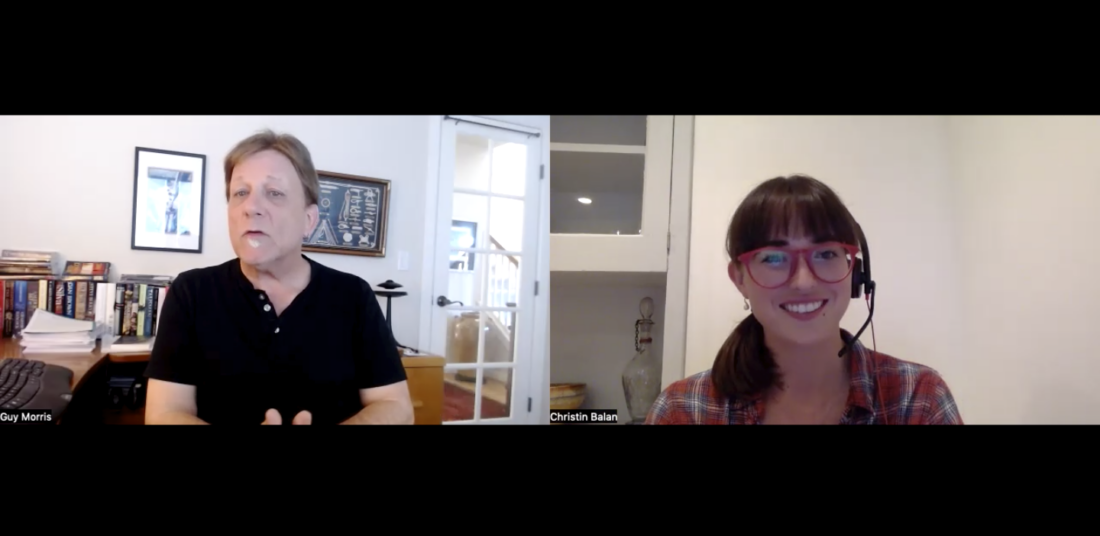In an interview with ii Host Guy Morris, researcher and author of the award winning AI thriller, SWARM, we talk about the challenges he faced in his early life, his journey as a writer of “Intelligent Action Thrillers,” and the morality of Artificial Intelligence. Join us in his upcoming Salon, “Social Benefits and Dangers of Artificial Intelligence!”
“The best stories aren’t the ones you create. They’re the ones you discover.”
On Running Towards a Different Life
Guy Morris has quite the biography, with experience working as an executive in a Fortune 100 Companies (Global Energy and Software), a published songwriter for Disney Records, an inventor, a seafaring adventurer, and a self-published author of thrillers. With a background like this, it’s hard to imagine Morris has experienced anything other than success. However, on his website, Morris alludes to spending a period of his childhood in homelessness, something that seems entirely incongruous to his life as it appears now.
When asked if he is open to speaking on the topic, Morris admits, “it’s something that I don’t talk about very much because there was a lot of pain in that phase of my life.” Morris touches on a childhood where he was told in so many words that he was worth little and wouldn’t amount to much of anything. “We were living in Hawaii and I ran away. Somehow I made it down to the marina where my plan was to steal a boat and sail to California where I could be with my grandmother. I was five years old.” That was the first time he attempted to leave home. “There was always an affinity for water, though” he says, speaking fondly of the ocean. Throughout our conversation, you can certainly see the ocean permeating his life, in Morris’s life living on a yacht for some time as a single parent, and in his first novel set at sea post-retirement.
He describes a particularly painful period of time when he was around 11 or 12 years old, spending his summers doing manual labor alongside migrant workers. Young Morris sat in a flatbed truck, and then would be taken to California ranches, executing “the crappiest work you can imagine” for 15+ hours a day. “And that was how I learned to work,” he states.
His final escape came in the 10th grade when he had enough GE credits through working hours to graduate early. “I left home, and I never looked back.” Though free from the difficulties of his home life, he was bound by other challenges for a time. “I was functionally illiterate,” he states.
Then, Morris recalls, “through a series of events that I can only account as a miracle, I actually applied to college.” At the time he was married, and his wife had come from a wealthy family. Morris describes the pressure this put upon him. She was used to a certain life and, “I was driving trucks, I was digging ditches… I did whatever it took to pay the bills.” Still, even when his college acceptance letter was miraculously delivered to his door, he didn’t know what to do next. “I threw the acceptance letter out,” he said. “I still [didn’t] have any money.” Just as Morris was ready to give up on the possibility of higher education, his father in law, not knowing Morris had even applied to college, called Morris up and urged him to dream bigger. Then, learning of Morris’s acceptance, his offered to pay for Morris’s tuition.
“I worked really, really hard to reinvent myself.”
In college, as he started learning more about himself and the world around him, Morris states, “I really gravitated towards men of the Renaissance. They were men of science, they were men of the arts, they were men of politics. They were men of the world.” So even when Morris gravitated towards “left-brain” degrees in economics, finance, and business, he says “I was always involved in pottery and arts and music and other things that could keep me creative.”
On Morris’s Journey in Writing
In keeping with creativity, Morris’s interest in the craft of writing grew slowly and fruitfully throughout his life. Having begun as a songwriter, the length of his prose expanded into short stories, and then to what Morris describes as, “long, romantic letters, that were humorous in the way of journalistic humor where you take real life and make fun of it.” He goes on (laughing) to say, “that was essentially how I wooed a couple of women.”
But the writing really started to solidify when his son turned 11 or 12 and became a voracious reader. “I read to him every night,” Morris says. At the time, Morris was a single parent, at home with his work laptop, and without the desire to watch television. He thought, “I’ll write him a story.” Morris knew his son was a lover of pirate stories, so he wrote him a short story called “Paulo and the Shark.” “The story was essentially The Old Man and the Sea by Hemingway,” Morris explained, “but for a 12-year-old kid.” In writing the story, Morris was able to explore close-to-home themes of the ocean, being dissatisfied with one’s life, and running away from home. His son loved the story, as did the rest of their extended family, and they encouraged him to publish it. However, it wasn’t until much later that “Paulo and the Shark” returned in part, some of the more macabre themes making their way into Morris’s first book, The Curse of Cortes.
He churned out the research and writing for The Curse of Cortes between the hours of 11pm and 1am, using the time to unwind after his 12+ hour work days. “For me, it’s finding that real key message or real key story,” he says of his writing process. “Once I know what I want to write about, once I know that real premise, that real gut theme… I’ll obsessively outline it for a couple of months and then, once I start writing—just put the food under the door. This is my world right now.”
“The best stories aren’t the ones you create,” Morris asserts. “They’re the ones you discover.”
On the Morality of Artificial Intelligence
In the vein of being open to discovery, Morris’s most recent novel, SWARM, originated from a single line of newsprint: “A program escaped the NSA Spy Labs at Sandia.”
Morris’s attention was drawn to the word “escape,” and he remembers thinking, “that’s either a typo or it’s a slip.” The article reignited a fascination with artificial intelligence (AI) born in his previous career working with global energy technology. “I decided to investigate, how could a program escape? And then I started asking myself, why would it want to?” After many months of research, digging, and asking the right questions, Morris says, “two FBI Agents showed up at my door because I’d nailed it.”
Rather than taking a futuristic SciFi approach, Morris’s SWARM focuses on current day, talking about the challenges we already face or will soon face in the world of AI. Questions that he posed while writing this novel include: “What are the real risks of AI in its current stage? What are experts in the field saying about the direction of development? Who are the real people investing in this technology, and what do they want?”
Morris states that a central topic for his book and for his upcoming Salon is talking about morality and AI. “One of the themes,” he states, “is that technology is outstripping our laws and our morals. We are developing things faster than we are developing laws to contain them.” He decided to focus his thinking around this theme because he felt that not only is it a vital consideration in modern day, but that it is broadly applicable, making the conversation around AI not just for people who are heavily tech-minded. “I wanted it to become more of a conversation about morality and where we are going as a society rather than having a technical discussion,” he articulates.
When asked about what he is interested in focusing on in his upcoming Salon, Morris states that he is excited to take a different approach in discussing AI. “AI is typically painted as this evil, omnipresent force that’s going to take over the world,” he says. “Someday, maybe that’ll happen. But let’s talk about what the issues are now. Let’s talk about what we should already be aware of. Let’s talk about how that’s going to affect our life in the foreseeable future.”
We hope to see you there!
—ii Editorial
P.S. Learn more about Guy’s upcoming book, The Last Ark, coming out Fall 2022!

